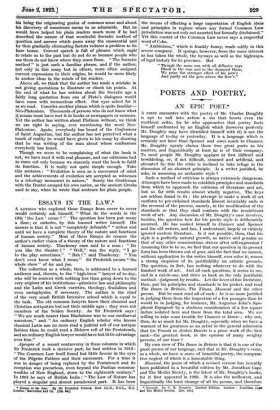ESSAYS IN THE LAW.*
A LAYMAN who explored these Essays from cover to cover would certainly ask himself, ." What do the words in the title ' the Law ' mean ? " The question has been put many a time; ex cathedra, by this learned writer himself. His answer is that it is not " completely definable" " unless and until we have a complete theory of the nature and functions of human society." Most of -these Essays do resume the author's earlier vision of a theory of the nature and functions of human society. Thackeray once said to a man : " Do you like the theatre ? " " Well,", was the reply, " I go to the play sometimes." " Bah I ". said Thackeray. " You don't even know what I mean." Sir Frederick means " the whole show" of Ear and jus.
The collection as a whole, then, is addressed to a learned audience and, therein, to the " high-brow " lawyer of to-day, who will be content with nothing less than going down to the very origines of his institutions—primitive law and philosophy and the Latin and Greek varieties, theology, feudalism and even metaphysics, if necessary. The author is the chief of the very small British Intensive school which is equal to the task. The old common lawyers knew their classical and Christian antiquities but not their middle ages : they were not members of the Selden Society.. As Sir Frederick says : " We are much nearer than Blackstone was to our mediaeval ancestors," and " An ordinary English scholar who knows classical Latin can no more read a judicial roll of our antique fashion than he could read a Hebrew roll of the Pentateuch, and an ordinaryEnglish lawyer would have but little advantage over him."
Apropos of a recent controversy in these columns in which Sir Frederick took a decisive part, he had written in 1918 :
" The Common Law itself found but little favour in the eyes of the Pilgrim Fathers and their successors. For a time it was in danger of being replaced by the Pentateuch and its reception was precarious, even beyond the Puritan common- wealths- of New England, down to the eighteenth century." In 1901 he says of British India : " The Law of Nature has Played a singular and almost paradoxical part. It has been • Snap its -Use ram.' Frederick Pollock, Bart LL.D., D.C.L., S.C. London Macmillan and Co, MI. EEL] the means of effecting a large importation of English ideas and principles in regions where any formal Common Law jurisdiction was not only not asserted but formally disclaimed." Yet this master of the COmmon Law never says a respectful word of Coke.
• " Arabiniana," which is frankly funny, reads oddly in this severe company. It springs, however, from the same interest as has taken the whole, the byways as well as the highways, of legal history for its province. But
" Though the same sun with all diffusive rays Blush in the rose and in the diamond blaze, We prize the stronger effort of his pow'r And justly set the gem above the flow'r."










































 Previous page
Previous page